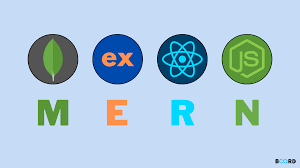1. What is the MERN Stack, and why is it popular?
Answer: The MERN stack comprises four technologies:
-
MongoDB: A NoSQL database for storing data in flexible, JSON-like documents.
-
Express.js: A web application framework for Node.js that simplifies server-side coding.
-
React.js: A JavaScript library for building user interfaces, particularly single-page applications.
-
Node.js: A JavaScript runtime that allows server-side execution of JavaScript code.
Its popularity stems from its use of JavaScript on both the client and server sides, facilitating seamless development and efficient data flow between components.
-
-
The MERN stack is a JavaScript-based full-stack development framework comprising MongoDB (NoSQL database), Express.js (web application framework), React (frontend library), and Node.js (JavaScript runtime).
-
-
Explain the role of each component in the MERN stack.
-
MongoDB: Stores data in a flexible, JSON-like format.
-
Express.js: Handles server-side logic and routing.
-
React: Builds dynamic user interfaces
-
Node.js: Executes JavaScript code on the server side.
-
-
Why choose the MERN stack for web development?
-
It allows for end-to-end JavaScript development, facilitating seamless integration between frontend and backend, and benefits from a large community and extensive libraries.
-
-
What are the advantages of using MongoDB in the MERN stack?
-
MongoDB offers a flexible schema design, horizontal scalability, and stores data in a JSON-like format, which aligns well with JavaScript-based applications.
-
-
How does Node.js handle asynchronous operations?
-
Node.js uses an event-driven, non-blocking I/O model, allowing it to handle multiple operations concurrently without waiting for previous tasks to complete.
-
-
What is Express.js, and how does it simplify server-side development?
-
Express.js is a minimal and flexible Node.js web application framework that provides robust features for building web and mobile applications, simplifying tasks like routing, middleware integration, and request handling.
-
-
Describe the virtual DOM in React.
-
The virtual DOM is a lightweight JavaScript representation of the real DOM. React uses it to optimize rendering by updating only the changed parts of the DOM, enhancing performance.
-
-
How do you create a basic route in Express.js?
const express = require('express');
const app = express();
app.get('/', (req, res) => {
res.send('Hello World');
});
app.listen(3000, () => {
console.log('Server is running on port 3000');
});
-
What is JSX in React?
-
JSX stands for JavaScript XML. It allows developers to write HTML elements and components in JavaScript, which React transforms into standard JavaScript objects.
-
-
How do you pass data between React components?
-
Data can be passed from parent-to-child components using props and from child to parent using callback functions. Tools like Redux or Context API can be used for complex state management.
-
-
How would you architect a scalable MERN stack application with role-based access and real-time updates?
What this tests:
-
System design capabilities
-
Authentication/authorization knowledge (JWT, OAuth, RBAC)
-
Real-time communication using WebSockets (e.g., Socket.IO)
-
Code organization and scalability planning
What to cover in your answer:
-
Backend:
-
Use Express.js + Node.js
-
Structure controllers, routes, services for modularity
-
Use JWT for auth, middleware for RBAC
-
Use Redis (optional) for session or pub/sub caching
-
-
Frontend:
-
Use React with React Router for SPA routing
-
Role-aware route protection (HOC or custom hooks)
-
Real-time updates via Socket.IO client
-
-
Database:
-
MongoDB schema design
-
Use Mongoose for schema-based modeling
-
-
DevOps:
-
Dockerize the app
-
Use environment-based configs (dotenv)
-
Deploy on platforms like Vercel (frontend) and AWS/GCP (backend)
-
12. Explain how to implement secure user authentication and session management in a MERN stack app.
What this tests:
-
Security understanding
-
Auth/session lifecycle
-
Cookie vs. token-based auth tradeoffs
What to cover in your answer:
-
Use bcrypt to hash passwords
-
Use JWT stored in HttpOnly cookies for better XSS protection
-
Implement refresh tokens and access token lifecycle (short-lived tokens)
-
Use CSRF protection (especially with cookies)
-
Validate input using libraries like Joi or Zod
-
Monitor for brute force login attempts (rate limiting, captcha)
-
Bonus: Mention OAuth 2.0 (e.g., Google login) and 2FA (TOTP or SMS)
13. How do you optimize performance in large-scale React applications?
What this tests:
-
Frontend optimization strategy
-
Real-world performance considerations
What to cover in your answer:
-
Use React.memo, useMemo, useCallback to avoid unnecessary renders
-
Use dynamic import() and React.lazy/Suspense for code splitting
-
Debounce user input (e.g., search bars)
-
Use virtualization (e.g.,
react-windoworreact-virtualized) for rendering large lists -
Keep component trees shallow — break into atomic design
-
Analyze bundle size with Webpack Bundle Analyzer
-
Pre-fetch data and cache using React Query or SWR
-
Minimize re-renders by flattening prop structures or memoizing context values
14. How would you implement a microservices approach in a MERN-based architecture?
What this tests:
-
Architectural thinking
-
Understanding of services, APIs, and communication protocols
What to cover in your answer:
-
Break features into independent services:
-
Auth service
-
User service
-
Product/order service, etc.
-
-
Use REST APIs or GraphQL as communication layers
-
Use message brokers (e.g., RabbitMQ, Kafka) for decoupled communication
-
Each service has its own database (polyglot persistence) — e.g., MongoDB, Redis
-
Centralized logging and monitoring (e.g., ELK stack or Prometheus + Grafana)
-
Deploy using Docker and orchestrate with Kubernetes (or simpler tools like Docker Compose for small setups)
-
Ensure backward compatibility in APIs and use API gateways (like Kong or NGINX)
-









 Evan John
Evan John